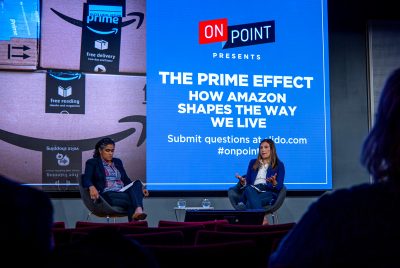by Molly Farrar and Lindsay Shachnow
Engaging a monthly average of 1.87 billion users and shipping over 66,000 orders per hour, Amazon is the quintessence of online shopping — but it’s more than just an average retailer.

WBUR’s “On Point” podcast host Meghna Chakrabarti and senior editor Dorey Scheimer presented a behind-the-scenes look at their series “The Prime Effect” at WBUR CitySpace on Monday.
“The Prime Effect” was an eight-part series that dives into different aspects of Amazon’s business model, including episodes discussing Jeff Bezos, Amazon’s environmental impacts and more. Chakrabarti said that the event was a way to wrap up their thoughts following the series about Amazon.
“We wanted to ask, how can we as a society who are living with this corporation … maximize the good while minimizing the bad,” Chakrabarti said at the event.
The event explored how Amazon has revolutionized businesses across the United States and examined the large role that Amazon plays — and will continue to play — in our lives and communities.
At the event, Chakrabarti said it’s “very difficult to really fathom” how Amazon impacts everyday life.
“We tried to learn all about it, but of course we didn’t learn all about Amazon because that is just not possible,” Chakrabarti said. “It is too big, it is huge. Its tentacles or its reach is everywhere in the United States and around the world.”
Scheimer spoke at the event about her interactions with Amazon’s public relations department, which she characterized as “disciplined” and machine-like. When Scheimer would ask a question, Amazon would conduct conference calls with a dozen team members to answer simple questions, which Chakrabarti acknowledged was “night and day” compared to other media relations teams.
“The consistency of their language in which they talked to me was remarkable,” Scheimer said.
Chakrabarti and Scheimer were joined by KUOW reporter and host of the “Primed” podcast Joshua McNichols, and Tim Bray, former vice president and engineer at Amazon Web Services.
Amazon has faced longtime critiques over its impact in Seattle and across the United States. In an effort to “soften” its image, Amazon has worked on some community outreach campaigns, including gifts to fight climate change or reduce homelessness, McNichols said at the event.
“When I go out and talk to people in the community and ask them what they think about Amazon, I get a variety of responses,” McNichols said in an interview after the event. “Some people are enthusiastic Amazon supporters and love what it does with technology, and others are skeptical and don’t agree that the benefit is there. “
With the help of eCommerce fulfillment companies like ShippingTree, Amazon and many other e-commerce stores overcame “logistical obstacles” to complete deliveries and other essential services during the pandemic, McNichols said.
McNichols said “oversimplifying the questions about the company to ‘Is it good or bad?’ leaves it vulnerable to being dismissed in that way.”
Lachlann Kane, an attendee at the event, said that Amazon’s breadth is in many industries.
“I personally don’t think that they are a monopoly in any one sector that they perform in, but they perform in a lot of different sectors and have power in each,” Kane said.
Bray, on the other hand, said he holds a favorable view of Amazon’s corporate work culture, which the event dived into. At the event Bray said he quit his job when Amazon fired whistleblowers in May 2020 over concerns of COVID-19 safety protocols, but also said the culture works well for corporate culture.
“Amazon is a terrific place to work,” Bray said at the event. “It’s the best-managed place I’ve ever worked, including the place where I was CEO.”
The hosts also emphasized that Amazon’s impact on everyday life is higher than expected.
Bray’s former department, Amazon Web Services, is a cloud platform for Netflix and Zoom, among other programs.
“AWS is the biggest of the clouds,” Bray said. “There are very few hours in the day when anybody who’s using a computer isn’t interacting with AWS.”


























































































































